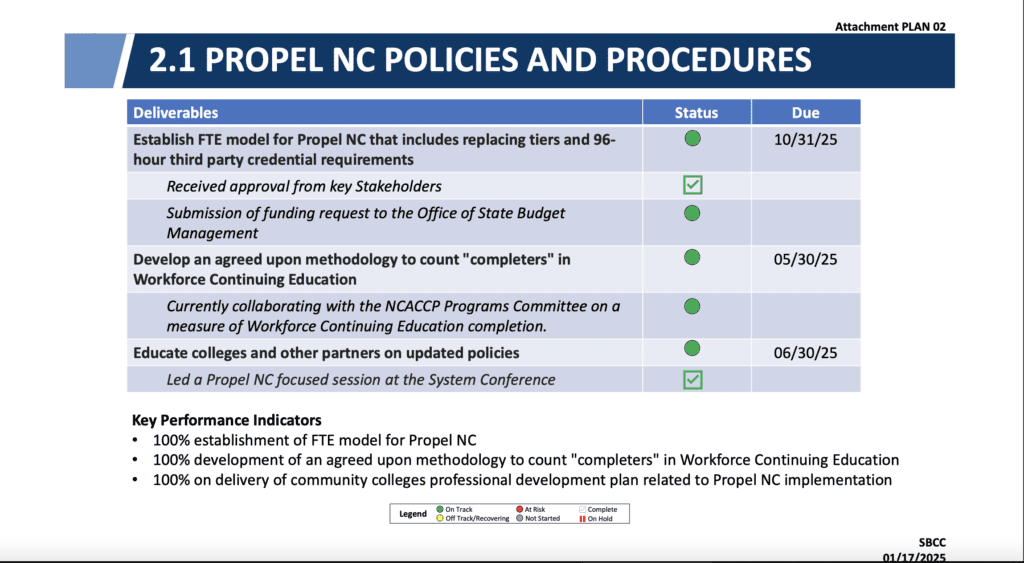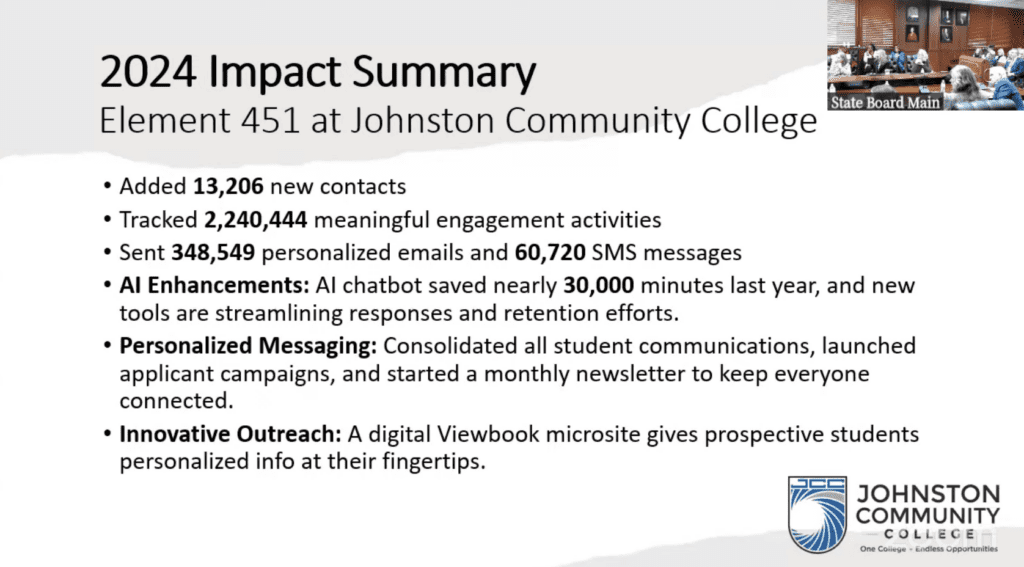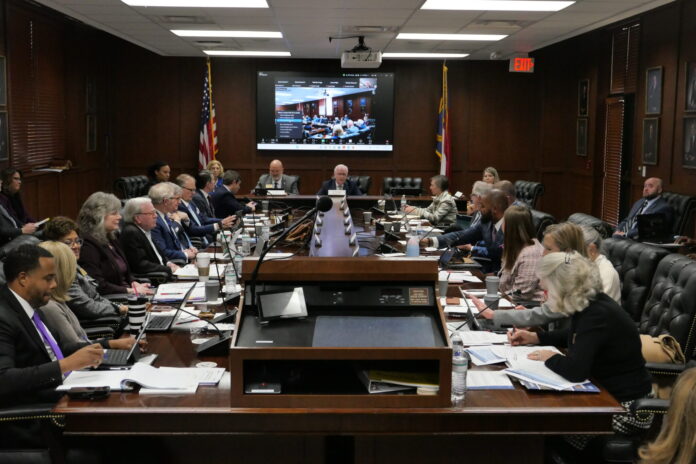The State Board of Community Colleges discussed the N.C. Community College System’s (NCCCS) legislative agenda for the 2025 long session at its meeting last week, which includes the system’s primary ask of funding for Propel NC.
The system is asking lawmakers for nearly $100 million to implement Propel NC, the system’s new funding model that was first unveiled last January.
“The North Carolina Community College System’s budget priorities focus on modernizing and stabilizing funding for North Carolina’s community colleges to better align with workforce demands, economic growth, and operational needs,” the legislative agenda says.
The system’s current funding model allocates resources to colleges in proportion to the number of full-time equivalent (FTE) students they enroll in each of their programs. Certain courses receive more state funds than others based on a four-tier funding model.
Propel NC would shift the current FTE funding tiers to “workforce sectors,” with courses ranked and valued by statewide salary job demand data every three years. All curriculum and continuing education (CE) courses would reside in the same workforce sector. The NCCCS says this shift “prioritizes connecting students to high-demand, high-wage jobs.”
The workforce sectors would also allow “programs offerings to be better aligned and transparent with business and industry needs,” according to the legislative agenda.
The anticipated cost of this component of the model is approximately $68.5 million, according to the system.
Here’s a look at the other components of Propel NC:
- Increase in base funding. The plan calls to increase base allocation funds by approximately 5.8%, “which closes the gap to actual spending patterns and account for inflation,” per a 2024 NCCCS document. “This modification would also increase the enrollment allotment above 750 FTE based on this increase in other costs funding.” The anticipated cost for this request is about $24.4 million.
- Enrollment increase reserve. The current enrollment growth reserve was implemented in 2010 in response to the large number of students enrolling in community colleges after the Great Recession. The system is requesting $6 million in non-recurring funds for a fixed per-FTE amount for any colleges that go over the enrollment threshold set by their FTE for the fiscal year. The system would then like to build replenishment of the fund into the recurring enrollment growth fund in the state budget.
- Excess tuition retention. Excess tuition receipts currently fund the enrollment increase reserve. Propel NC would change that, allowing excess tuition receipts to return to the college which generated them, but only on years when the system as a whole generates excess receipts.
Read more about Propel NC
Propel NC received an unanimous vote of approval from all 58 members of the N.C. Association of Community College Presidents (NCACCP) and more than 200 letters of endorsement from business and industry partners across the state.
Supporters of Propel NC also include myFutureNC, whose 2025 policy recommendations include the “implementation of Propel NC in alignment with NC Workforce Credentials, & incentivizing regional collaboration & credit for prior learning.”
NCCCS Director of Government Relations Alex Fagg said leaders will continue advocacy efforts with lawmakers in the coming months. He said the system has heard great feedback from lawmakers and business leaders so far.
Last short session, budget proposals from both chambers included $18.5 million in funding for the first phase of Propel NC, but no compromise budget was passed before lawmakers adjourned the session. In the proposals, that funding was for “funding model workforce parity.”
On Friday, Sen. Michael Lee, R-New Hanover, gave brief remarks to the Board before Fagg’s legislative update. While he did not explicitly endorse Propel NC, he did praise the Board and local colleges for “all the innovative work that they’re working on.”
“The community college system and the individual colleges have the ability to be really innovative,” Lee said. He added that the system should “not just move at the speed of business, but move at the speed of innovation.”
Since last fall, system leadership has been working to make sure that policies, codes, and guidance to support local colleges are available if Propel NC funding is approved.
On Thursday, the Board received a brief update on how that work is going.
“We’re not just going to the legislature and saying, ‘Please provide funding for this work,’” said Dr. Patrick Crane, the system’s vice president of strategic initiatives. “We are also demonstrating how we are updating our policies and procedures at the system level to be able to prepare for that investment… and do what we need to do to ensure that we have more students entering and succeeding in these workforce-focused programs.”
Here is a look at some of the policies the system is working to update related to Propel NC. The system is also working to develop labor marker and outcomes data tools to help inform decisions about academic programs.

Other legislative asks
The system’s legislative agenda also includes a few other asks.
First, the document asks that lawmakers “support community college recovery efforts as Hurricane Helene assessments continue.”
The 25 counties in the original federal disaster declaration for Hurricane Helene included 14 community colleges.
In October, the General Assembly’s second hurricane-relief bill included $5 million toward spring 2025 tuition grants for eligible students at six community colleges “which were designated most or medium impacted by the Community College System Office.” Those colleges are Asheville-Buncombe Technical Community College, Blue Ridge Community College, Haywood Community College, Mayland Community College, McDowell Technical Community College, and Western Piedmont Community College.
Last week, Fagg said the system is continuing to assess the impact of Helene.
“We continue to talk with our colleges, what capital needs do they need? What are their FTE losses due to the hurricane?” he said. “We don’t have those numbers yet, but we want to be sure whenever we submit, it’s backed and defensible.”
Second, the system is asking lawmakers to “fully fund FY 2024-25 community college enrollment growth.”
In November, following the override of the governor’s veto of the mini budget, the community college system received $76 million for enrollment growth and receipts from Fiscal Year (FY) 2023-24.
Fifty-two of the state’s 58 colleges experienced enrollment growth last fiscal year, according to the system.
Without the enrollment growth funding, some colleges were facing large budget deficits for this fiscal year, which impacts planning for the spring semester. Many of those deficits were in the millions of dollars.
While the adjustment is not statutorily required, it has historically been included in the state’s two-year and adjustment budgets.
Next, the system is asking that community colleges are included in capital and equipment funding proposals in the budget.
According to the legislative agenda, a 2024 survey identified nearly $3 billion in community college capital and equipment needs.
Finally, the Board is asking lawmakers to allocate funding for Alamance Community College’s newly approved multi-campus center (MCC). That center was approved by the Board in November, and the system said MCC funding for the college would be approximately $637,951.
You can read the system’s full legislative agenda here.


At the first meeting of 2025, several new Board members were sworn in, including three officials who were elected in November:
- Democratic Lt. Gov. Rachel Hunt.
- Republican Treasurer Brad Briner.
- Republican Labor Commissioner Luke Farley.
- Robert Moore, who fills the seat of Dr. Grant Campbell, who was elected to the state House.
- Autumn Queen, student representative and president of the NC Comprehensive Community College Student Government Association (N4CSGA).
The new members spoke about their excitement to be part of the great work community colleges do.
“We are the engine — community colleges — that will ensure the economic mobility of our people all over North Carolina,” Hunt said.
Listen to the audio clip for more remarks from Hunt.
On Friday, the Board also unanimously elected member John Kane to serve as vice president of the Board, as Campbell formerly served in the role.
Finally, the Board also approved the presidential candidate at Pamlico Community College. The college announced that acting President Zac Schnell, who had served as the institution’s chief administrator since November, was appointed to the college’s top job permanently.
Schnell, a Wilmington native who has led the college’s Environmental Science Technology program since 2016, had been named acting president following the unexpected death of Interim President Michelle Willis Krauss Nov. 7.
Krauss, the college’s vice president of instruction and chief academic officer, had been appointed interim president last year following the retirement of President Dr. Jim Ross, which was effective in February 2024.
Schnell, who lives in Arapahoe, said he looks forward to his new role with the college.
“I am excited to work with our team here to build on our accomplishments and to help lead the college forward,” he said. “Pamlico County is a wonderful place, and all of us at the college are dedicated to providing new opportunities for our community to grow together and thrive. I am eager to strengthen partnerships and to create new ones. I’m ready to hit the ground running.”
Excerpt from Pamlico Community College’s release
According to the system, there are now only three local president vacancies remaining across the system.
An update on CRM, minority male success initiative, and more
Last week’s meeting started with a transformative discussion on Thursday about leveraging technology to improve student experience and enrollment.
Specifically, the Board heard an update on efforts to implement customer relation management (CRM) tools across the system, including Element451, a higher-ed CRM that uses artificial intelligence (AI).
On Thursday, leaders at Forsyth Technical and Johnston community colleges shared their positive experiences using the platform.
Forsyth Tech started contracting with Element451 in 2020 in an attempt to address declining enrollment and achievement gaps. Today, President Dr. Janet Spriggs told the Board, gaps have narrowed and enrollment is at a 10-year high.
“No matter how I slice the pie of demographics at my college… every student is doing better than they did in 2019,” she said.
Here is a look at impact shared by Johnston Community College:

Twenty-nine of the system’s 58 colleges are currently contracting with Element51, according to Element451 CEO and Founder Ardis Kadiu.
The General Assembly previously funded a pilot for programs at five colleges, Chair Tom Looney said. The pilot has since been expanded to five more schools in western North Carolina.
Looney and Cox both said the system is working to make the platform available across the system.
During the system’s presentation on updates to its strategic plan, Executive Communications Director Nathan Hardin said funding for a statewide CRM solution is crucial to developing an integrated system-wide marketing plan.
“This project (marketing plan) is crucial for boosting student enrollment in high-demand sectors through an integrated, end-to-end marketing strategy that augments and complements local college marketing capacity,” the presentation says.
Here’s a quick look at other meeting items:
- The Board approved its 2023-34 report on the Minority Male Success Initiative (MMSI), which was first established in 2003 and redesigned in 2016-17. Half of NCCCS colleges provide intentional programming to support minority male students, according to the report. These students saw overall improvement in course success rates, the report said, “although English and math course success rates were flat or declining.” The system said there is a need for better data moving forward.
- The Board allotted $4 million in high-cost workforce start-up funding to support new health care workforce programs offered at eight community colleges. After this allocation, there is about $2 million left of the $20 million in funds the General Assembly allocated in 2023.
- The system is working with the Belk Center to conduct a system office climate survey, Cox told the Board. Those results are expected by the end of March, to be shared in May.
- Finally, the Board allocated $1 million to support a pilot program for digital credentials, as directed in hurricane-relief bill Senate Bill 382. The pilot would essentially give students digital access and ownership to their transcripts and credential documents, while allowing various state entities to also access the data. Cape Fear Community College was selected to lead the pilot program and allocated $500,000 to do so.
The full Board’s next meeting is Feb. 20-21.





